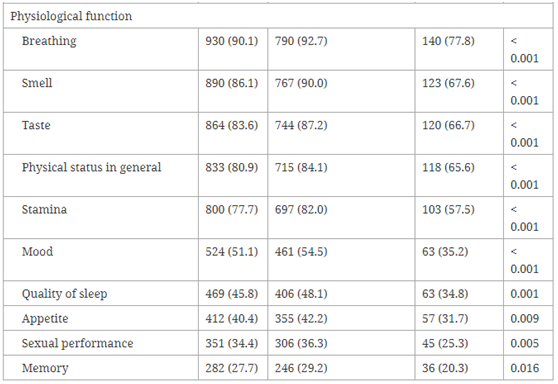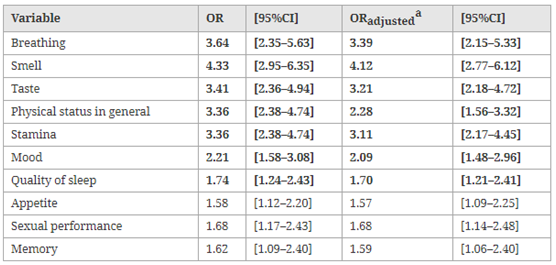
Health Effects Of E-Cigarettes-From A Study In Hungary
In 2015, 1,042 adult Hungarian e-cigarette users were surveyed. To explore the comparison of self-reported adverse events and perceived health changes among Hungarian adult e-cigarette users and dual users (smokers who use e-cigarettes versus conventional cigarettes).
Prevalence of vaping-related adverse events and perceived improvement in physiological functions


In the survey of adverse events, the number of e-cigarette smokers was 859, accounting for 82.4percent; the number of double smokers was 183, accounting for 17.6percent. As can be seen from the table, the adverse events reported by e-cigarette users only were related to dry mouth and throat, accounting for 3.5percent. Cough and oral cavity were associated with 13.1percent and 6percent of adverse events reported by dual-use subjects. Compared to e-cigarette users, dual users experienced cough, mouth, dizziness, and palpitations.
From the table of physiological functions, we can see that about 90percent of e-cigarette users experience better breathing, smell, and taste. About half of e-cigarette users have improved mood, sleep quality and appetite. For the investigation of physiological function, the possibility of improving the health experience of e-cigarette users is significantly higher than that of double users.
Perceived improvement in physiological functions in e-cigarette-only users and dual users: binary logistic regression analyses

A series of binary logistic regression analyses were performed to compare the health improvement rates of the two types of users. E-cigarette users were more than three times more likely to have improved smell, breathing, taste and endurance than double smokers. They were also twice as likely to report physical conditions, mood and sleep quality. There was no significant difference in the rate of improvement in appetite, sexual ability and memory between e-cigarette users and dual users.
found
Our study found that only e-cigarette users reported improved health and reduced health impact on vaping compared to two users. Most users who only used e-cigarettes reported better breathing and sensory function and reported only minor adverse events since they started using e-cigarettes. Compared with traditional cigarettes, both smell and taste function are better. Low exposure to potentially toxic substances in e-cigarettes may have a similar but perhaps weaker effect on olfactory mucosa.
Improved breathing, general physical condition , and endurance were associated with past smoking habits and duration of e-cigarette use. The most common improvement in these physiologic functions was respiration, is in line with a study in the Netherlands. 90percent of them have better breathing.
Users of e-cigarettes alone experienced significant improvements in their mental health. They reported greater improvements in mood and sleep quality. Because they think these e-cigarettes are the same attractive with traditional cigarettes and are a less harmful alternative to it. Improved emotional and psychological quality of life and perceived better respiratory function may explain positive changes in sleep quality.
In our analysis, we also identified three major areas of perceived health improvement attributable to e-cigarette use. Sensory improvements include improvements in smell and taste. Improvements in body function include improved breathing, physical health, and increased endurance. Finally, mental health improvement factors include improved appetite, sex life, mood, memory, and sleep. We also noted that dual-users reported much less improvement across all three dimensions than users who only used e-cigarettes. This result suggests that more significant health improvements are associated with complete cessation of regular smoking. The longer the e-cigarette was used, the higher the score of sensory improvement and physical function. Interestingly, smoking intensity before e-cigarette use was also associated with improved sensory and physical function dimensions, suggesting that heavy smokers may have more benefit from switching from combustible cigarettes to e-cigarettes than light smokers.
Adverse events, oral and throat discomfort. The use of glycerin, propylene glycol - glycol, and electronic liquid flavoring agents may form during the steam generation process as thermal degradation by-products, which can also be tongue and/or oral pain and oral and throat irritation. Finally, inhalation of e-smoke sol elements such as silicon, sulfur, calcium, titanium, and lithium is associated with throat irritation.
Why Your Throat is Uncomfortable While Vaping?
conclusion
In summary, our study concluded that most users who used e-cigarettes alone reported more beneficial perceived physiological function and that adverse event were less frequent than among dual users. However, despite the uncertainty of long-term health consequences, the short-term benefits of e-cigarette use could strengthen users. But e-cigarettes are not without their negative health consequences. The effects of e-cigarettes on the body will take a long time to study and investigate. Minors under the age of 18 are prohibited from smoking.
reference:https://bmcpublichealth.biomedcentral.com/articles/10.1186/s12889-019-6629-0#Tab2
2019 What Does A Heavy Smoker Think Of E-Cigarette;




